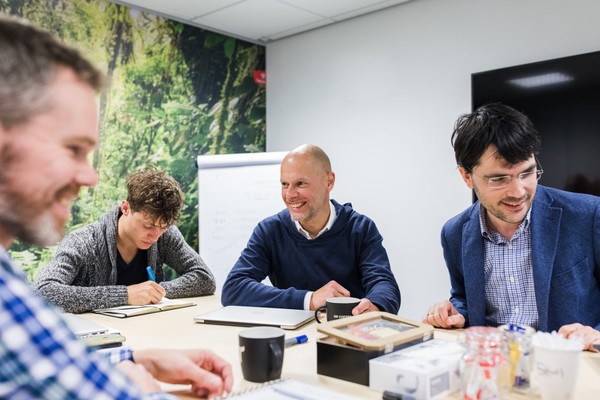cases >> ReCarbn
NEXT ICON: RECARBN

NEXT ICON: RECARBN
We have not yet succeeded in combating climate change - and that has consequences. That's why it is time to add more innovative solutions. Guus Dubbink, Ewout Ruijs and Sophia Hummelman are working on such a solution. With UT spinoff ReCarbn, founded in 2022, they are committed to capturing CO2 from the atmosphere to resolve the greatest challenge of our time.
This story was previously published in the Next Icons Magazine. You can read the entire magazine here.
Please tell us how your innovation contributes to solving climate issues.
Guus: "The carbon capture technology we apply is a key factor in combating climate change. That does not mean it is a golden ticket; we should still decrease emissions. It’s a difficult task, and that’s why we’re here to help. With our innovation, we can retrieve carbon from the atmosphere that we should not have emitted and reuse it. That creates a kind of 'reverse global warming'. Additionally, our technology allows us to replace fossil fuels with a sustainable alternative, since the CO2 we capture from the atmosphere can be reused through various routes."
What does the world look like if air capture is common?
Ewout: "Direct air capture is promising. Eventually, it will allow us to stop using fossil fuels. The temperature will slowly return to normal levels. Corals will have a chance to grow again and biodiversity will increase. Our innovation makes it possible to walk around in a net zero society."
Sounds like a bright future. And there are more companies working toward that same future. How do you differentiate yourselves?
Ewout: "Many of these companies are confronted with their own energy consumption. After all, direct air capture takes a lot of energy. You don't want to consume more than you can take out of the air. Other parties also have very high costs. We think we can solve those two problems with our innovation. We are more energy-efficient, more productive, faster and we have a scalable concept. In the long term, we want to continue distinguishing ourselves by setting up a solid R&D organization together with UT scientists."
Sophia: "We have already taken the first steps in setting up such a research organization. In a short period of time, we managed to select a strong core team and everyone is working with great enthusiasm for our mission. This mission appeals to many people: for our first vacancy for a marketing intern, we received more than sixty responses."
That mission is driven in large part by innovation. How important is innovation to you?
Guus: "Innovation means that you create something that is new and brings about a social change that would not have happened without your contribution. In climate tech, as far as I am concerned, that should be mostly in the hardware, not the software. But even more important than form is that innovation must be relevant and thus have scalability potential. The Netherlands is relatively small. That means it must be very strong in exporting innovation. That's why we are working on an engineering solution that we can build in the Netherlands and then export for maximum impact."
Ewout: "I concur with that. I also always want to enthuse other startup founders to solve the biggest problems of our time with hardware."
That's a tall order. Are you fully aware of the scope?
Sophia: "We're fairly down-to-earth, but the thought of working on a big task is helpful. Even when you run into challenges, that huge mission provides extra motivation. Before this, all three of us had very satisfying jobs. It is an incisive decision to break away from all that to join a startup. But we also see the bigger picture. That is why we do what we do."

"Before this, all three of us had very satisfying jobs. It is an incisive decision to break away from all that to join a startup."
Sophia Hummelman
Co-founder & CCO ReCarbnMore about
ReCarbn
ReCarbn aims to capture 1 megaton of CO2 between now and 2035, thereby helping to limit global warming to 1.5 °C. They aim to filter CO2 out of the air in an affordable and easily scalable way. Their young and ambitious team combines years of experience in carbon capturing technology and is complemented with commercial business and financial backgrounds. The ReCarbn technology is developed at the University of Twente since 2012.






